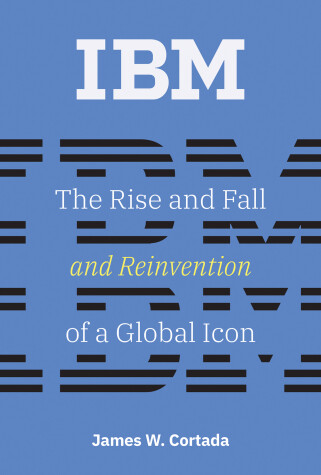History of Computing
2 total works
For decades, IBM shaped the way the world did business. IBM products were in every large organization, and IBM corporate culture established a management style that was imitated by companies around the globe. It was “Big Blue”—an icon. And yet over the years, IBM has gone through both failure and success, surviving flatlining revenue and forced reinvention. The company almost went out of business in the early 1990s, then came back strong with new business strategies and an emphasis on artificial intelligence. In this authoritative, monumental history, James Cortada tells the story of one of the most influential American companies of the last century.
A historian who worked at IBM for many years, Cortada examines IBM throughout the decades, offering insights on the company’s:
• Technology Breakthroughs: the punch card (1890s), the calculation and printing of Social Security checks (1930s), the introduction of the PC to a mass audience (1980s), and the shift from hardware to software.
• Business Culture
• Global expansion
• Regulatory and Legal Issues
• CEOs
The secret to IBM’s unequalled longevity in the information technology market, Cortada shows, is its capacity to adapt to changing circumstances and technologies.
From Urban Legends to Political Fact-Checking
by William Aspray and James W. Cortada
This text presents an historical examination of political fact-checking, highlighting how this is part of a larger phenomenon of online scrutiny that manifests itself in multiple forms. Reflecting the long history of “fake facts” in America, the book discusses important developments in this area from the emergence of the public Internet in the 1990s to the start of the Trump-Clinton presidential election campaigns.
Topics and features: describes how some of the major players in political fact-checking began with the purpose of scrutinizing and debunking of urban legends; considers how this was part of a wider culture, encompassing B-grade horror movies, truth-or-fiction television shows, and groups warning about computer viruses; explains how such developments are connected, revealing political fact-checking as one of many forms of scrutiny applied in the face of a complex, dangerous world; provides a range of detailed case studies, covering such topics as the rumors surrounding the 9/11 terrorist attacks, and academic interest in contemporary legends; discusses how pre-Internet technologies such as bulletin boards, Usenet, and proprietary online service providers such as CompuServe and AOL were used to both disseminate and debunk urban legends; examines the rise of political fact-checking, reviewing all of the major initiatives in this area undertaken in the United States.
This timely study touches on issues of popular culture and major events, and offers profiles of colorful individuals and organizations, and as such will appeal to a broad audience interested in the history of fact-checking and efforts to protect the political process from falsehoods.

